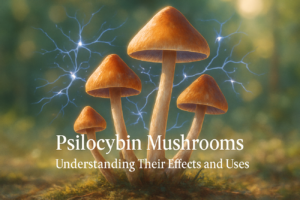Psilocybin, a naturally occurring compound found in certain mushrooms, is being studied for its potential to support mental health and overall well-being. Known for its effects on emotional balance, cognitive function, and mental clarity, psilocybin therapy is gaining attention as an alternative approach to traditional mental health treatments.
From its roots in ancient healing practices to its modern-day use in clinical studies, psilocybin is being explored for its potential to promote emotional well-being, break negative thought patterns, and provide a new perspective on mental health challenges.
At Standard Bliss by Standard Extracts, we embrace the benefits of psilocybin therapy as part of a holistic wellness approach. Whether you’re exploring new ways to enhance your mental clarity, relieve emotional distress, or improve overall mental health, our premium psilocybin products are designed to support your wellness journey.
Contact us today to learn more.
Table of Contents
- What is Psilocybin Therapy?
- The Science Behind Psilocybin and Mental Health
- How Psilocybin Therapy Works
- Mental Health Conditions Psilocybin Can Treat
- The Benefits of Psilocybin Therapy
- Challenges and Risks of Psilocybin Therapy
- Psilocybin in Clinical Trials and Studies
- The Future of Psilocybin Therapy
- Explore the Benefits of Psilocybin Therapy
What is Psilocybin Therapy?
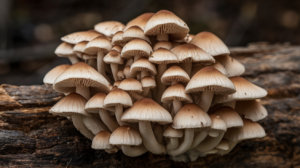 Psilocybin therapy involves using psilocybin, the active compound in psychedelic mushrooms, to treat mental health disorders such as depression, anxiety, and PTSD. The therapy usually includes guided sessions with a trained therapist who offers support throughout the experience. This structure allows patients to explore their thoughts and emotions in a safe environment.
Psilocybin therapy involves using psilocybin, the active compound in psychedelic mushrooms, to treat mental health disorders such as depression, anxiety, and PTSD. The therapy usually includes guided sessions with a trained therapist who offers support throughout the experience. This structure allows patients to explore their thoughts and emotions in a safe environment.
Psilocybin works by interacting with serotonin receptors in the brain, which control mood and emotions. By targeting these receptors, psilocybin therapy helps patients break free from negative thought patterns, potentially offering new perspectives on their mental health challenges.
The Science Behind Psilocybin and Mental Health
Psilocybin primarily interacts with serotonin receptors, especially the 5-HT2A receptor. Once ingested, psilocybin is converted into psilocin, which mimics serotonin. This interaction produces changes in mood, perception, and cognition, leading to heightened awareness and emotional clarity.
Studies have shown that psychedelics like psilocybin promote neuroplasticity, the brain’s ability to form new neural connections. This process can help individuals move beyond rigid, unhealthy thought patterns commonly seen in mental health conditions such as depression, anxiety, and PTSD.
Additionally, psilocybin has been found to activate areas of the brain that are typically less active in people with depression. These changes could help reset brain activity, leading to lasting improvements in mood and overall mental health.
How Psilocybin Therapy Works
Psilocybin therapy typically follows a structured process guided by a licensed therapist. Here’s how it usually unfolds:
- Preparation: Before the psilocybin session, patients typically meet with their therapist for preparatory sessions. During these sessions, the therapist helps the patient set goals and intentions for the experience, ensuring they are mentally and emotionally prepared.
- The Experience: The therapy session itself takes place in a controlled, comfortable environment, with calming music and a therapist available for support. The patient consumes psilocybin, usually in the form of a capsule or tea, and the effects typically last between 4 to 6 hours.
- Integration: After the experience, integration sessions help the patient process any insights or emotions encountered during therapy. These follow-up sessions provide a space for the therapist and patient to discuss the experience, reflect on new perspectives, and create actionable steps for addressing any mental health concerns.
Mental Health Conditions Psilocybin Can Treat
Research into psilocybin therapy has demonstrated its potential to treat a variety of mental health conditions, including:
 Depression: Psilocybin has shown promise in reducing symptoms of depression, especially in patients who haven’t found relief with traditional treatments such as antidepressants.
Depression: Psilocybin has shown promise in reducing symptoms of depression, especially in patients who haven’t found relief with traditional treatments such as antidepressants.- Anxiety: Psilocybin therapy has helped individuals with anxiety, particularly those facing existential anxiety related to terminal illnesses.
- PTSD: Clinical trials suggest that psilocybin can help people with PTSD by enabling them to confront traumatic memories in a therapeutic setting, reducing their emotional intensity.
- Addiction: Growing evidence suggests that psilocybin may help treat substance use disorders by altering brain pathways linked to compulsive behavior.
- End-of-life distress: Psilocybin therapy has been found to reduce emotional distress for terminally ill patients, easing fears around death and improving overall well-being.
The Benefits of Psilocybin Therapy
Psilocybin therapy offers several potential benefits:
- Long-lasting improvements: Many patients report lasting changes after just one or two therapy sessions, unlike traditional treatments that may require continuous use.
- Enhanced emotional well-being: Psilocybin helps individuals process complex emotions and gain valuable insights, leading to greater emotional resilience and stability.
- Reduction in mental health symptoms: Psilocybin has shown promise in reducing symptoms of depression, anxiety, and other conditions, allowing patients to experience a sense of relief and well-being.
- Increased openness: The therapy fosters a greater sense of openness and acceptance, which can improve relationships and overall life satisfaction.
Challenges and Risks of Psilocybin Therapy
While psilocybin therapy holds great promise, it is not without its challenges and risks:
- Legal issues: Psilocybin remains illegal in many parts of the world, making it difficult for people to access this treatment.
- Psychological discomfort: Though many people experience transformative sessions, others may face difficult emotions or anxiety. It’s important that therapy takes place in a supportive environment.
- Not a quick fix: Psilocybin therapy may not work for everyone, and some individuals may require multiple sessions to see significant benefits.
- Unpredictable outcomes: The effects of psilocybin can vary widely between individuals, and not everyone will experience the same therapeutic effects.
Psilocybin in Clinical Trials and Studies
Psilocybin is being actively studied in clinical trials around the world. In fact, it has been granted “breakthrough therapy” status by the U.S. Food and Drug Administration (FDA) for treating depression, indicating its potential to revolutionize mental health treatment.
Research has shown that psilocybin can significantly reduce symptoms of depression and anxiety, even in patients who have not responded to traditional treatments. Ongoing studies are also investigating psilocybin’s potential to address other conditions, such as chronic pain, eating disorders, and certain neurological diseases.
The Future of Psilocybin Therapy
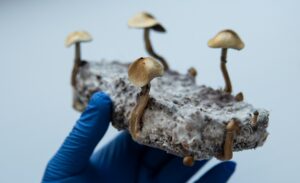 Psilocybin therapy is still in its early stages, but the future looks promising. As research continues to unfold, psilocybin may become a widely accepted treatment option for various mental health conditions. With increasing support from the medical community and changes in legal regulations, psilocybin could become a critical tool in mental health care.
Psilocybin therapy is still in its early stages, but the future looks promising. As research continues to unfold, psilocybin may become a widely accepted treatment option for various mental health conditions. With increasing support from the medical community and changes in legal regulations, psilocybin could become a critical tool in mental health care.
As psilocybin therapy continues to gain attention, it may redefine how we approach mental health treatment, offering new hope for individuals seeking relief from their mental health struggles.
Explore the Benefits of Psilocybin Therapy
Psilocybin therapy is being explored for its potential to support mental health and emotional well-being. As interest in alternative therapies grows, psilocybin is gaining recognition for its ability to help individuals break free from negative thought patterns and find clarity.
Standard Bliss by Standard Extracts offers premium psilocybin products designed to support mental clarity, emotional balance, and overall well-being.
Call us today to learn more about how psilocybin therapy can help improve your mental health and enhance your wellness journey.

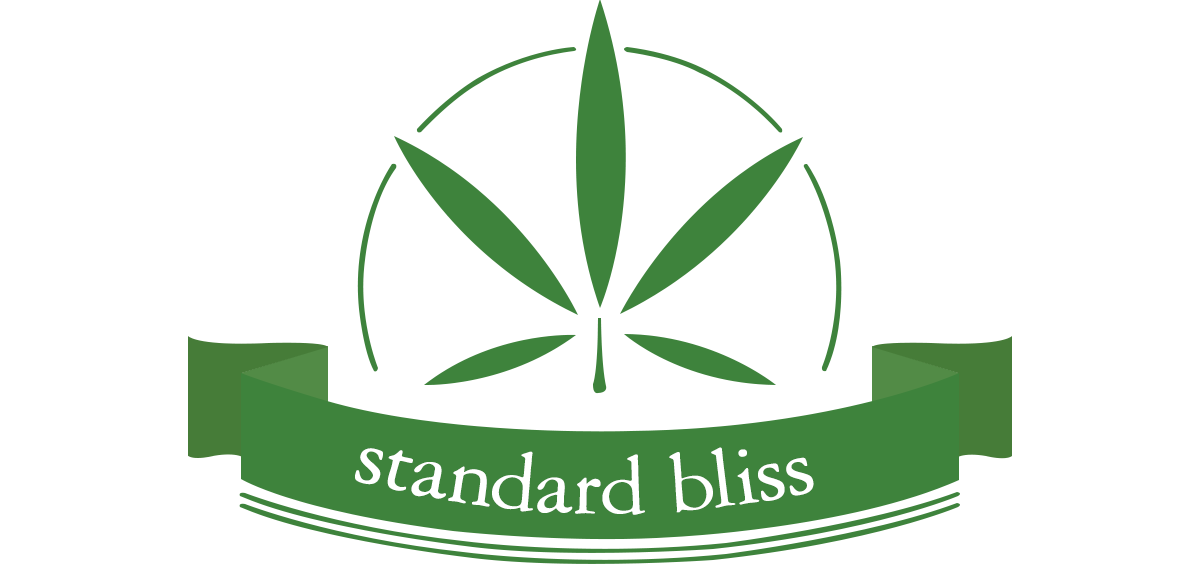
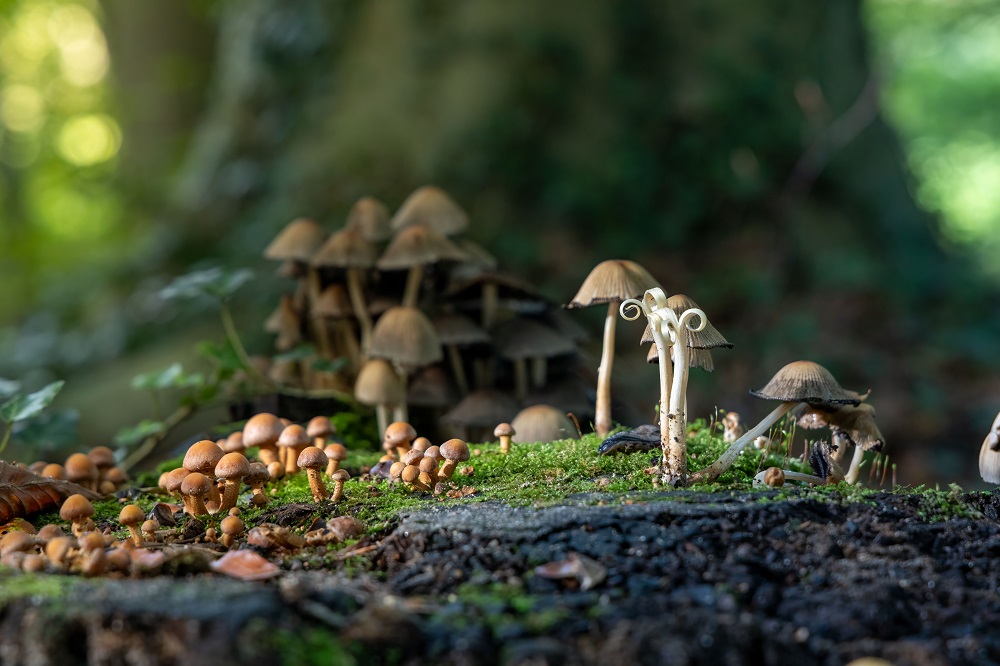
 Psilocybin therapy involves using psilocybin, the active compound in psychedelic mushrooms, to treat mental health disorders such as depression, anxiety, and PTSD. The therapy usually includes guided sessions with a trained therapist who offers support throughout the experience. This structure allows patients to explore their thoughts and emotions in a safe environment.
Psilocybin therapy involves using psilocybin, the active compound in psychedelic mushrooms, to treat mental health disorders such as depression, anxiety, and PTSD. The therapy usually includes guided sessions with a trained therapist who offers support throughout the experience. This structure allows patients to explore their thoughts and emotions in a safe environment. Depression: Psilocybin has shown promise in reducing symptoms of depression, especially in patients who haven’t found relief with traditional treatments such as antidepressants.
Depression: Psilocybin has shown promise in reducing symptoms of depression, especially in patients who haven’t found relief with traditional treatments such as antidepressants. Psilocybin therapy is still in its early stages, but the future looks promising. As research continues to unfold, psilocybin may become a widely accepted treatment option for various mental health conditions. With increasing support from the medical community and changes in legal regulations, psilocybin could become a critical tool in mental health care.
Psilocybin therapy is still in its early stages, but the future looks promising. As research continues to unfold, psilocybin may become a widely accepted treatment option for various mental health conditions. With increasing support from the medical community and changes in legal regulations, psilocybin could become a critical tool in mental health care.
